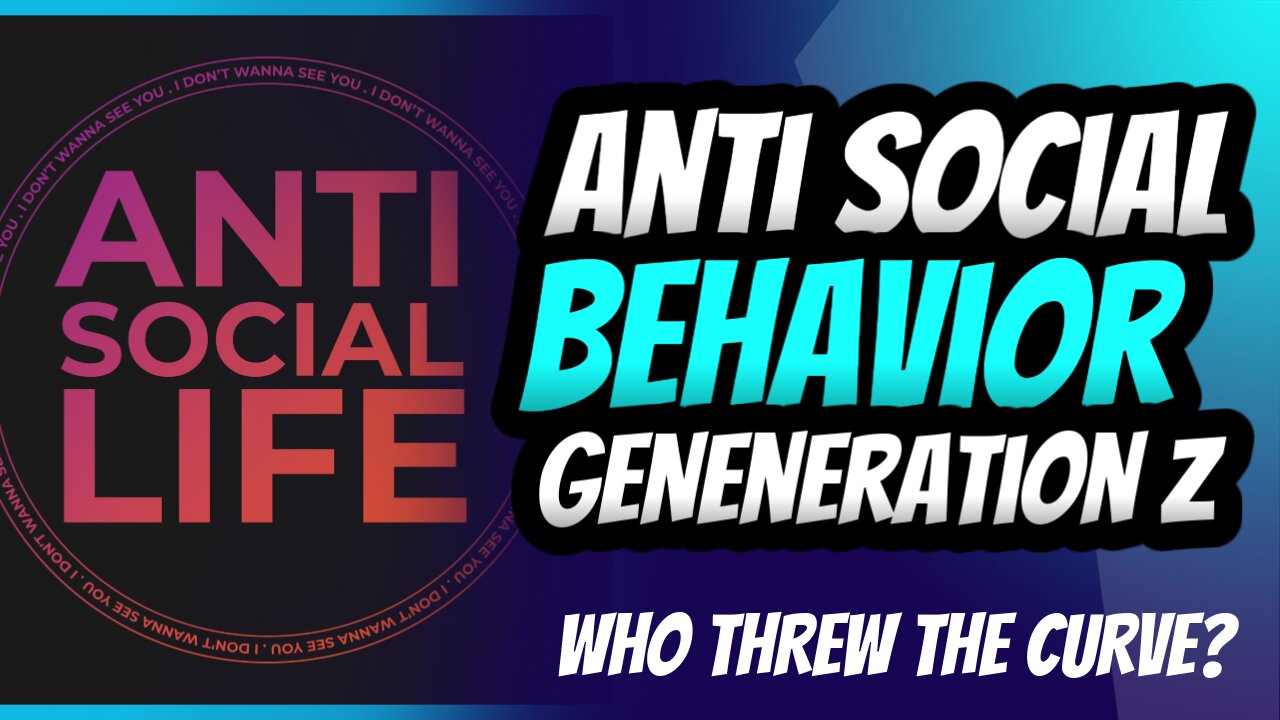Premium Only Content

Anti Social Behavior: Why Generation Z Struggle To Make Friends #genz #podcast #nyc #texas #fyp #fy
Understanding the Challenges Faced by Generation Z in Establishing Social Connections
Anti-social behavior, particularly the struggle to make friends, has become a growing concern within Generation Z. With the advent of advanced technology and the proliferation of social media platforms, this generation faces unique challenges in establishing social connections compared to previous generations. This essay aims to explore the reasons behind this phenomenon, providing insights into the impact of technological advancements, social media, societal changes, and psychological aspects on Generation Z's ability to form friendships.
Technological Advancements:
Technological progress has significantly transformed the way individuals interact and communicate. Generation Z has grown up in an era dominated by smartphones, social media platforms, and virtual communication. While these advancements offer convenience and connectivity, they also present obstacles to face-to-face socialization. The constant reliance on technology can hinder the development of crucial social skills, such as effective communication, empathy, and conflict resolution. Additionally, virtual interactions may provide a false sense of connection, leading to a decline in meaningful, in-person friendships.
Social Media:
The rise of social media platforms has revolutionized the way people connect and share information. Generation Z, having grown up in the era of social media dominance, is particularly vulnerable to its influence. While social media offers opportunities for self-expression and online friendships, it can also contribute to feelings of isolation, comparison, and low self-esteem. The curated nature of online profiles and the pressure to conform to unrealistic standards can negatively impact self-perception, making it challenging for individuals to form authentic connections in the offline world.
Societal Changes:
Societal shifts have also played a role in shaping Generation Z's social landscape. Factors such as increased urbanization, changing family structures, and the prevalence of dual-income households have contributed to decreased face-to-face interactions. The emphasis on academic achievement and extracurricular activities may leave little time for socializing, further limiting opportunities for meaningful connections. Additionally, the fast-paced and individualistic nature of modern society may foster a sense of social detachment, making it difficult for individuals to establish and maintain close relationships.
Psychological Aspects:
Psychological factors can significantly influence the ability to form friendships. Some Generation Z individuals may experience social anxiety, shyness, or a fear of rejection, which can hinder their willingness to engage in social interactions. The pressure to conform to social norms and expectations can create barriers to authentic self-expression, leading to a sense of social isolation. Moreover, mental health issues such as depression and loneliness, which have been on the rise among young people, can further exacerbate difficulties in building and maintaining friendships.
In The End:
Generation Z faces distinct challenges in establishing social connections, resulting from a combination of technological advancements, social media, societal changes, and psychological factors. Recognizing and addressing these challenges are crucial for promoting healthy social development among young individuals. Strategies such as promoting digital literacy, fostering face-to-face communication
-
 LIVE
LIVE
Steven Crowder
3 hours ago🔴BREAKING: Tulsi Drops Major Receipts Proving Obama Treason over Trump Russia Hoax
33,820 watching -
 LIVE
LIVE
Nikko Ortiz
44 minutes agoLive - Most Painful Clips
407 watching -
 LIVE
LIVE
Barry Cunningham
11 hours agoDON'T MISS TODAY'S WHITE HOUSE PRESS CONFERENCE WITH KAROLINE LEAVITT (AND MORE NEWS)
1,246 watching -
 LIVE
LIVE
The Mel K Show
49 minutes agoMORNINGS WITH MEL K - Seditious Conspiracy to Defraud the PEOPLE of the United States of America 7-23-25
879 watching -
 LIVE
LIVE
LFA TV
14 hours agoLFA TV ALL DAY STREAM - WEDNESDAY 7/23/25
5,535 watching -
 LIVE
LIVE
Law&Crime
3 hours ago $1.39 earnedLIVE: Bryan Kohberger Sentencing — ID v. Bryan Kohberger
801 watching -
 LIVE
LIVE
The Shannon Joy Show
2 hours ago🔥🔥Running Scared!! Speaker Mike Johnson SHUTS DOWN The House To Avoid The Massie Vote To Release The Epstein Files!🔥🔥
305 watching -
 UPCOMING
UPCOMING
Grant Stinchfield
43 minutes agoIt's NOT Mortgage Fraud... It's Election Fraud! Strip Sen. Schiff of His Seat Now!
-
 45:25
45:25
The Rubin Report
1 hour ago'Shark Tank' Legend Destroys Economy Narrative w/ One Fact
11.7K5 -
 1:01:05
1:01:05
VINCE
3 hours agoOBAMA: Is It Treason Then? | Episode 91 - 07/23/25
178K96